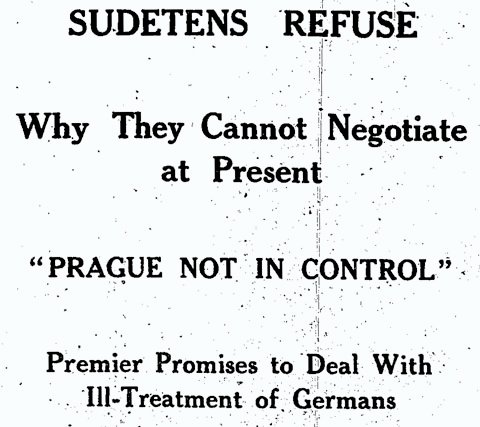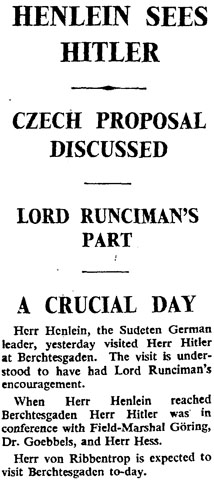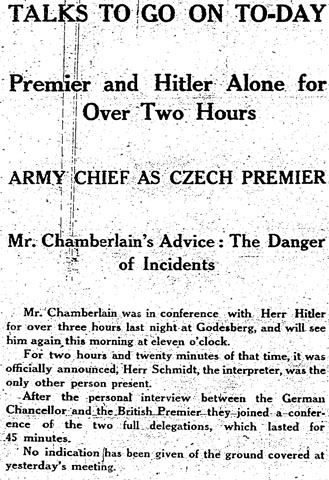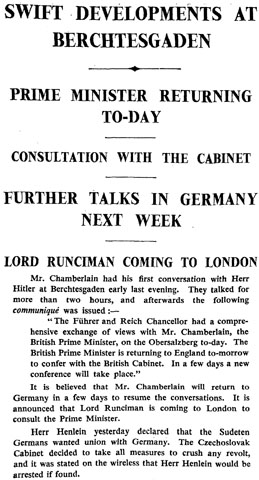
The headlines from the Manchester Guardian (p. 11) indicate that the situation is the same as yesterday, or a bit worse. The Sudeten leadership is still refusing to negotiate with the Czechoslovakian government, ostensibly because of the latter’s inability to maintain order in the country. This is despite a meeting between the Sudetens and the Czech Premier, Hodza, who promised that those responsible for the incident at Mährisch-Ostrau (reported yesterday) would be punished severely, and an official Czech investigation confirming that Sudetens have indeed been mistreated in the area. According to the Guardian‘s diplomatic correspondent (p. 11), incidents like this could be used by the Sudeten German party to declare that the breakdown of law and order has forced them to assume control of the Sudetenland, which in turn could be a prelude to secession and union with Germany.
The view from London is grim (p. 11):
The fear is growing here [presumably in the Foreign Office] that Hitler does not desire a genuine settlement, and if there is a settlement of any sort it will only have the purpose of tiding over the period that will lead to the long-anticipated and long-prepared attack on Czecho-Slovakia.
Chamberlain is back from Scotland, and Halifax has put off his trip to Geneva (presumably something to do with the League of Nations), which was planned for tomorrow. There will be a Cabinet meeting on Monday to discuss the crisis. On the other hand, there is evidence of resistance to war inside Germany, as information given to the Geneva correspondent (p. 11) from a German source suggests that General Ludwig Beck, the Chief of the Staff of the German Army, has resigned because of his belief that ‘an attack on Czecho-Slovakia would involved Germany in a war with England, France, and Russia, and perhaps other countries’. (True: Beck did resign for just this reason.) Also, ‘There is reason to believe that General Beck’s opinion is shared by other German military leaders’. Maybe Hitler can be restrained by his own army’s unwillingness for war?
The chances of that happening would depend upon strong signals from Britain, France and the Soviet Union that they are willing to fight Germany, if necessary. This is exactly what the Labour Party is demanding, as expressed in a statement made on its behalf at (and endorsed by) the Trades Union Congress by George Hicks, MP (p. 14):
the British Government must leave no doubt in the mind of the German Government that it will unite with the French and Soviet Governments to resist any attack on Czecho-Slovakia […] Whatever the risk, Britain must make its stand against aggression.
And in this respect, The Times‘s leader on Wednesday was unhelpful, at least according to a letter appearing in the Manchester Guardian today (p. 20). In it, William Goodchild of Glasgow (possibly Sir William Goodchild, a Scottish civil servant, though perhaps he’s a bit outspoken if so) attacks most vociferously the suggestion that the Sudetenland be given to Germany:
In other words, the “Times” suggests that international law and order should be thrown to the winds, and that Europe should submissively accept the brutal violence of totalitarian States which rely solely on force and the threat of force.
And the danger is that since The Times is known to be close to the government that the suggestion could be taken as taken as official kite-flying. Goodchild refers to an official denial of this which was made last night (which I haven’t come across). But then, if one turns to The Times (p. 7), one finds a statement from a Conservative MP and pro-appeaser, Sir Arnold Wilson, speaking at a League of Nations Union meeting, that he ‘welcomed the cautious suggestion’ made by The Times. Mind you, aside from yesterday’s examples, the letters column of The Times itself (p. 13) hasn’t exactly lit up with discussion of the secession idea: today’s topics of discussion include Rubens, Horace, Fox, and a debate about whether a particular line came from Voltaire, Tallyrand or Fouché. What a bunch of geeks!
Finally, a headline from The Times (p. 9):
THE HERRING IN WARTIME
Now there’s a book that needs to be written!
![]() This work is licensed under a Creative Commons Attribution-NonCommercial-NoDerivatives 4.0 International License.
Permissions beyond the scope of this license may be available at http://airminded.org/copyright/.
This work is licensed under a Creative Commons Attribution-NonCommercial-NoDerivatives 4.0 International License.
Permissions beyond the scope of this license may be available at http://airminded.org/copyright/.






Pingback: Airminded · Saturday, 10 September 1938